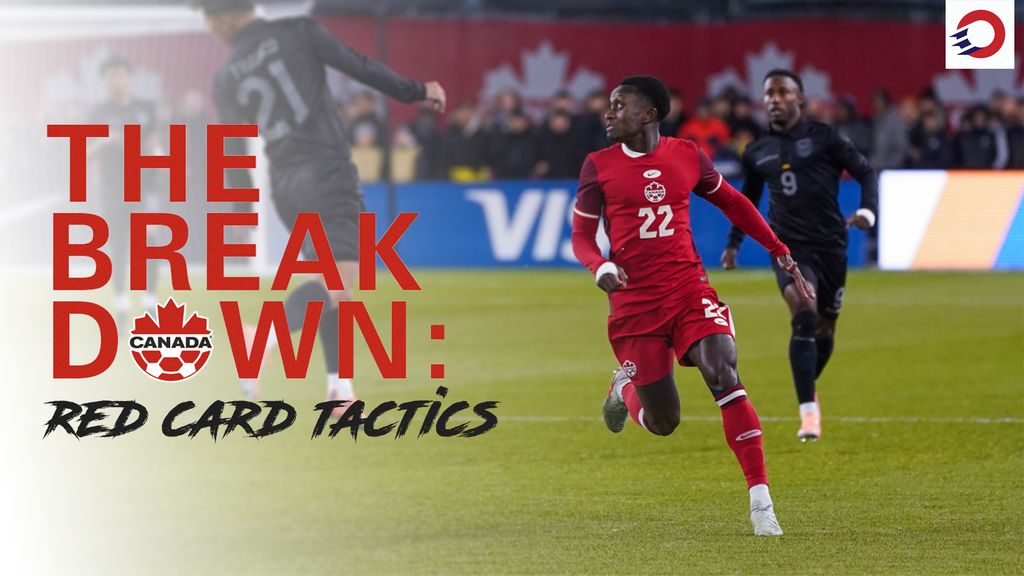THE BREAKDOWN: How the CanMNT maintained defensive solidity despite early red card vs. Ecuador

It might not have been the best version of the CanMNT, but it was certainly the most authentic.
Strength of character is often reflected in moments of adversity, and it’s safe to say that Canada were up against it early on in their match against Ecuador at BMO Field on Thursday.
Just minutes into their friendly against the CONMEBOL side, Canada faced the unexpected prospect of having to play 85 minutes of the match down a player, as Ali Ahmed was sent off just five minutes into the game for a reckless tackle.
Not only was there the surprise that Ahmed, who had just 12 yellow cards to his name as a professional (and none for Canada), was the one receiving the red card, but there was the shock that this was Canada’s second red card in the past six games - they had previously gone over three years without one.
RED CARD 🟥
— OneSoccer (@onesoccer) November 14, 2025
Ali Ahmed is sent off in the opening minutes of the game after a high foot, and the CanMNT 🇨🇦 are down to 10 men
🔴 Watch the #CanMNT LIVE on OneSoccer, TSN & FuboTV pic.twitter.com/khaME1r2BG
Given how things went for Canada last time they got a red card, which came in a penalty shootout loss to Guatemala in the quarter-finals of the 2025 Gold Cup this summer, it was worrying to imagine what Ecuador, who finished second in CONMEBOL 2026 World Cup qualifying, could do to Canada in similar circumstances.
Instead, though, despite being down a player, Canada held strong and grinded out one of their most impressive performances under Jesse Marsch, flexing that aforementioned strength of character in front of their home fans.
Not only did they battle their way to a 0-0 draw, but they were arguably the more dangerous team on the day, too, as they had 0.66 xG to Ecuador’s 0.42 despite the circumstances.
No doubt, they were up against it for most of the match - Ecuador held a whopping 76% of possession, as Canada attempted just 124 passes, completing only 67% of them - but Canada held strong when they needed to.
As a result, they held Ecuador to just four shots, with none of them reaching the target, while also limiting them to 15 touches inside the box.
Ultimately, most of Ecuador’s possession proved to be quite meaningless, as they aimlessly pushed the ball from one side to the other, waiting for Canada to open up and make a mistake - and those errors never came.
Meanwhile, when Canada won the ball back, they were quick and efficient with their possession, as they were able to generate that 0.66 xG off four shots and 10 touches in the box.
Tani Oluwaseyi's shot is saved by Galindez 😫
— OneSoccer (@onesoccer) November 14, 2025
🔴 Watch the #CanMNT LIVE on OneSoccer, TSN & FuboTV pic.twitter.com/WkQBiZmfpx
Certainly, Ecuador had chances that they’ll want back, as Willian Pacho had a glorious chance on a set-piece in the 65th minute, while Enner Valencia missed an open header in the 75th minute, but ultimately, as the numbers showed, they did not create enough quality opportunities given the numerical advantage they held.
Yet, credit has to be given to how Canada defended, as they once again flexed important growth in that area of their game en route to their eight clean sheet in their last 11 matches.
All of a sudden, they’re proving to be quite the formidable unit to break down, and while there remain concerns about the lack of goals they’re scoring at the other end (they’ve scored just one goal in their last four games), that shouldn’t erase the work being done at the back.
Returning to this game, however, one big thing that stands out is the way Canada defended while down a player, especially in the context of that aforementioned Guatemala loss.
Infamously, Canada struggled while down a player in that Guatemala game, as they were unable to defend the 1-0 lead they had at the time of Jacob Shaffelburg’s sending off in the fourth minute of first-half stoppage time.
As a result, Guatemala were able to claw back an equalizer from Rubio Rubin in the 69th minute, before prevailing on penalties to knock Canada out of the tournament in the quarter-finals, picking up a massive upset.
The big reason for Canada’s struggles vs. Guatemala, however? A lack of adjustment, as they continued to press high despite being down a player, as they shifted to a 4-2-3 from their 4-2-2-2, keeping three players high up the pitch at almost all times. 
Here's a still from that Guatemala game - as seen here, Canada is pressing aggressively in a 4-2-3, with their front 3 pushed up like normal (OneSoccer/TSN)
Instead of trying a more conservative 4-4-1 or a 5-3-1, Canada tried to stick to their aggressive defensive approach in that 4-2-3, and that cost them. Against rapidly tiring Canadian legs, Guatemala were able to outshoot them eight to one in the second half, generating 0.59 xG and two big chances, showing that their equalizer was thoroughly deserved. 
Here's another still from that Guatemala game, one where they once again pushed high up the field to win the ball. For context, this screengrab is from moments before Guatemala scored their equalizer, showing the effect of Canada's aggressive play (OneSoccer/TSN)
Against Ecuador, though, Canada decided to be a bit more cautious, as they shifted to a 4-4-1 without the ball, with Tani Oluwaseyi shifting from striker to the wing to help facilitate the tactical change.
From there, they tried to stay in two compact blocks of four underneath their lone striker, Jonathan David, who was tasked with applying light pressure from the front. 
Here's a still from the Ecuador game, one that shows how much more passive Canada were defensively, sitting back in a cautious 4-4-1, one that limits space for Ecuador to attack into (OneSoccer/TSN)
Knowing Ecuador’s threats in midfield, such as the in-form Moisés Caicedo and Pedro Vite, Canada tried to keep Ecuador to the outside of the pitch, where wingers Oluwaseyi and Tajon Buchanan awaited, as well as full-backs Richie Laryea and Niko Sigur.
Fittingly, that quartet were actually the four Canadian players who won the most duels in this game - Laryea won a game-high 11 out of 14 duels, while Oluwaseyi won seven out of 11, Buchanan six out of 13 and Sigur five out of nine - as they made sure to prohibit Ecuador from attacking the wide spaces the way Guatemala did at the Gold Cup. 
Here's another still from this Ecuador match, as Canada once again sits back in their 4-4-1, forcing Ecuador to come to them instead of chasing the ball (OneSoccer/TSN)
Along with the play of Stephen Eustáquio in midfield - he had a game-high four interceptions - and the rock-solid play of centre backs Joel Waterman and Kamal Miller, that proved to be a good combination, showing that Canada’s defensive success as a team was helped by a collection of good individual showings.
Plus, what’s most impressive about Canada’s defensive performance was that their starters were able to maintain this a lot longer than anyone would’ve expected, too.
Despite the early red card, Jesse Marsch surprisingly waited until the 79th minute to introduce fresh legs in the form of Junior Hoilett, Nathan Saliba and Jonathan Osorio, in a move that might’ve given some flashbacks to that Guatemala game, ironically.
On that day, Marsch infamously only made one substitution by the 71st minute, and didn’t use his full complement of substitutes, which was surprising given the way his team had continued to press - naturally, they ended up running out of energy quite early because of that.
This time, though, thanks to their more conservative approach, they were able to maintain their strong defensive posture for essentially the entire game, much to the frustration of Ecuador.
It wasn’t as if Canada stayed steady in their 4-4-1 all game - they had 15 minutes after half time where they returned to that 4-2-3 from the Guatemala match, and had a few other stretches where they kept pressing high - but any time they felt like the game might get too stretched, they showed good composure and started to sit back again.


Here are two stills from the period after halftime where Canada decided to press a bit in a 4-2-3, as they pushed their wingers up from the 4-4-1 they used earlier. They didn't stick in this 4-2-3 very long, but by doing this, they were able to keep Ecuador honest in possession, while giving their own defensive line a bit of a break from sitting back (OneSoccer/TSN)
That’s a credit to Marsch and his team, who clearly took that Guatemala performance to heart and proved that with the savvy that they showed throughout this match.
“We knew what our strategies were, so all I had to do was make the tactical adjustment, and then they knew how to execute,” Marsch said of his team’s defending against Ecuador. “So I think being in that (Guatemala) game, and looking at what went well and what could’ve gone better, I think it helped us.”
“Still, I think the principles of how we press, how we make things difficult for opponents, how we try to hit on transition, and the confidence we had on the ball, you saw that while down a man.”
“I think we benefited from Guatemala, and also our entire time together - I feel like this team continues to use every experience to get stronger, which is a great feeling as a coach.”
In the end, that’s a big win on a day that otherwise would have felt like a bit of a waste to this Canadian team. 
Here's a perfect clip to showcase the way Canada balanced sitting back in their 4-4-1, while applying light pressure whenever they felt it was right to do so, eventually leading to them recovering the ball in a good position (OneSoccer/TSN)
Ultimately, given this team’s struggles at breaking down low blocks, being down a player for such a large chunk of this game will feel like a missed opportunity, as Canada were unable to truly test their attack against one of the best defensive teams in the world.
At the same time, it’s worth remembering that something like an early red card could very well happen during a World Cup game next summer - and now Canada knows that they can still get a result out of such a game, should that recur.
Yet, that’s why it was important for them to flex their strength of character the way they did in this game. For all of the growth they’ve had tactically under Jesse Marsch - and for all of the growth still to come - that strength of character remains a key underlying driver of this team’s success, as they showed on Thursday, and that will be just as important to their World Cup ambitions as anything else.
“I said to the team that maybe it's not our best game, but it might be our most important,” Marsch finished. “Because of the intelligence, the maturity, the savviness and the understanding of how to handle a good opponent, while staying concentrated in the match for over 90 minutes of being a man down.”

